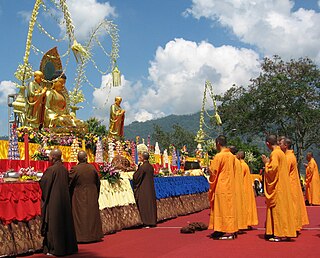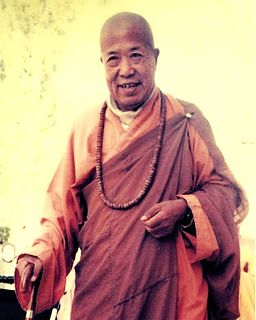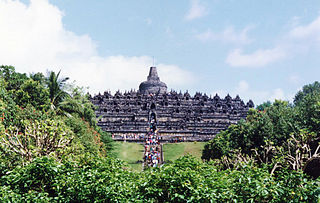
Vesak, also known as Buddha Jayanti, Buddha Purnima and Buddha Day, is a holiday traditionally observed by Buddhists in South Asia and Southeast Asia as well as Tibet and Mongolia. The festival commemorates the birth, enlightenment (Nibbāna), and death (Parinirvāna) of Gautama Buddha in Theravada, Tibetan Buddhism and Navayana.

In Buddhism, Buddha, "awakened one", is a title for those who are awake, and have attained nirvana and Buddhahood through their own efforts and insight, without a teacher to point out the dharma. The title is most commonly used for Gautama Buddha, the founder of Buddhism, who is often simply known as "the Buddha". Buddhahood is the condition and rank of a buddha "awakened one". This highest spiritual state of being is also termed sammā-sambodhi.

Chinese Buddhism or Han Buddhism is a Chinese form of Mahayana Buddhism which has shaped Chinese culture in a wide variety of areas including art, politics, literature, philosophy, medicine and material culture. Chinese Buddhism is the largest institutionalized religion in Mainland China. Currently, there are an estimated 185 to 250 million Chinese Buddhists in the People's Republic of China. It is also a major religion in Taiwan and among the Chinese Diaspora.

Nichiren Shū is a combination of several schools ranging from four of the original Nichiren Buddhist schools that date back to Nichiren's original disciples, and part of the fifth:
The World Fellowship of Buddhists (WFB) is an international Buddhist organization. Initiated by Gunapala Piyasena Malalasekera, it was founded in 1950 in Colombo, Ceylon, by representatives from 27 nations. Although Theravada Buddhists are most influential in the organization,, members of all Buddhist schools are active in the WFB. It now has regional centers in 35 countries, including India, the United States, Australia, and several nations of Africa and Europe, in addition to traditional Buddhist countries.
Buddhist eschatology, like many facets of modern Buddhist practice and belief, came into existence during its development in China, and, through the blending of Buddhist cosmological understanding and Daoist eschatological views, created a complex canon of apocalyptic beliefs. These beliefs, although not entirely part of Orthodox Buddhism, form an important collection of Chinese Buddhist traditions which bridge the gap between the monastic order and local beliefs of Imperial China.

Buddha's Birthday is a Buddhist festival that is celebrated in most of East Asia and South Asia commemorating the birth of the Prince Siddhartha Gautama, later the Gautama Buddha, who was the founder of Buddhism. According to Buddhist tradition, Gautama Buddha was born c. 563–483 BCE in Lumbini, Nepal.

Hsuan Hua, also known as An Tzu, Tu Lun and Master Hua by his Western disciples, was a Chinese monk of Chan Buddhism and a contributing figure in bringing Chinese Buddhism to the United States in the late 20th century.

Buddhism has a long history in Indonesia, and is recognized as one of the six recognized religions in Indonesia, along with Islam, Christianity, Hinduism and Confucianism. According to the 2018 national census roughly 0.8% of the total citizens of Indonesia were Buddhists, and numbered around 2 million. Most Buddhists are concentrated in Jakarta, Riau, Riau Islands, Bangka Belitung, North Sumatra, and West Kalimantan. These totals, however, are probably inflated, as practitioners of Taoism and Chinese folk religion, which are not considered official religions of Indonesia, likely declared themselves as Buddhists on the most recent census. Today, the majority of Buddhists in Indonesia are Chinese, however small communities of native Buddhists also exist.

Bodhi Day is the Buddhist holiday that commemorates the day that Gautama Buddha (Shakyamuni) is said to have attained enlightenment, also known as bodhi in Sanskrit and Pali. According to tradition, Siddhartha had recently forsaken years of extreme ascetic practices and resolved to sit under a peepal tree, also known as a Bodhi tree, and simply meditate until he found the root of suffering, and how to liberate oneself from it.

Buddhism is an ancient Indian religion, which arose in and around the ancient Kingdom of Magadha, and is based on the teachings of Gautama Buddha who was deemed a "Buddha", although Buddhist doctrine holds that there were other Buddhas before him. Buddhism spread outside of Magadha starting in the Buddha's lifetime.
Piya Tan Beng Sin, also known as Piya Tan or Piyasilo, is a Peranakan full-time lay Buddhist writer-cum-teacher in Singapore. He actively teaches the Buddha's Dharma, meditation and Pali to various Buddhist groups and organisations, and also works as a meditation therapist and counsellor at The Minding Centre (TMC). He is the first full-time lay Dharma worker ("Dharmacari") in Singapore to be supported by donations from the Buddhist community.
The Young Buddhist Association (YBA) is an auxiliary lay group of the Buddhist Churches of America, the mainland U.S. branch of Jodo Shinshu Buddhism. Founded in 1974 and originally known as the "Young Men's Buddhist Association", the YBA began as a way to offer communal activities for young Japanese-American Shin Buddhist men in the United States. It has evolved into an organization that is comprised usually of young teen boys and girls who are members of Shin temples, and is not limited to any one ethnicity. Many Shin temples have YBA groups, which organize fun activities and overnight trips for their young people. Regional conferences are scheduled yearly in which YBA groups from different temples may mingle and share ideas and friendship.

Ven. Thich Nhat Tu or Thích Nhật Từ (釋日慈) in Vietnamese is a Vietnamese Buddhist reformer, an author, a poet, a psychological consultant, and an active social activist in Vietnam. He is committed to propagate Buddha's teachings through education, cultural activities and charitable programs in order to benefit the individuals and the society at large.

Ashin Jinarakkhita, born Tee Boan-an 戴满安 was an Indonesian-born Chinese who revived Buddhism in Indonesia. He was also known as Bhante Ashin, Tizheng Lao Heshang 體正老和尚, Teh-ching, Sukong 師公 (Grandmaster), and The Flying Monk.

Sanggar Agung Temple or Hong San Tang is a Chinese temple in Surabaya dedicated to Chinese deities and other Asian religious icons. It is located within the Pantai Ria amusement park and has become a tourist destination, even though it is originally a worship place for Tridharma followers. The name of Sanggar Agung is derived from Indonesian language which can be translated as Great Hall.

Sanghyang Adi Buddha is a concept of God in Indonesian Buddhism. This term was used by Ashin Jinarakkhita at the time of Buddhist revival in Indonesia in the mid-20th century to reconcile the first principle of the official philosophical foundation of Indonesia (Pancasila), i.e. Ketuhanan Yang Maha Esa that requires the belief in a supreme God, which Buddhism, strictly speaking, does not believe in. This concept is used by the Indonesian Buddhist Council, an organization that seeks to represent all Buddhist traditions in Indonesia such as Theravada, Mahayana, and Vajrayana.

Richard Jun Hong Lu is also known as Lu Tai Zhang due to his setting up Australia Oriental Media Buddhist Charity Association (AOMB) in Austria and working as Chairman.

Fo Guang Shan Temple of Toronto was built to serve as a cultural, educational, community and spiritual centre for Chinese Buddhism and those interested in Buddhist teachings and practice. Founded by Venerable Master Hsing Yun in 1991 and completed in 1997, Fo Guang Shan Temple of Toronto is one of the over 400 Fo Guang Shan Temples worldwide. It was founded with the intention to propagate Humanistic Buddhism to the local community in the Greater Toronto Area, which emphasizes bringing Buddhist teaching into our daily lives and maintaining harmony with the environment, society, each other and within ourselves.














